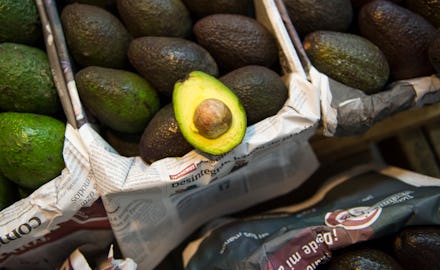What is a border adjustment tax? How the GOP might fund the Mexico wall — and what it means for you

President Donald Trump remains intent on building a Mexico border wall, leaving open big questions about how (and by whom) it would be paid for.
For a brief period Thursday afternoon, it seemed like we had an answer: A 20% tax on Mexican imports — at which point Twitter promptly had a meltdown about potentially higher prices for hot sauce, guacamole, and fresh produce.
But as New York Times correspondent Neil Irwin pointed out, White House press secretary Sean Spicer may not have been referring to a direct tax on imports or tariff, but rather a somewhat less controversial House GOP proposal for a "destination-based cash flow tax" with a border adjustment.
You'd be forgiven for misunderstanding, as Spicer has made seemingly contradictory statements; as you can see in a CNN clip, Spicer suggests we "tax imports from countries that we have a trade deficit from, like Mexico."
"It isn't precisely clear," said the Tax Foundation's Kyle Pomerleau in an email, when asked what kind of tax Spicer was talking about. "It is possible they are talking about the border adjustment that is part of the House GOP plan."
What Pomerleau is describing is a very different proposal. The idea is that — in addition to lowering the corporate tax rate from 35% to 20% — the GOP plan would border-adjust business taxes to apply to all goods consumed in the United States: whether or not they were produced in the U.S.
Products made domestically and sold abroad wouldn't be affected.
That's how "the border adjustment is not a tariff," Pomerleau said. "Rather, it is part of an overall package to convert the corporate income tax."
If Spicer were talking about this kind of border tax, put forward by House Speaker Paul Ryan and his allies, Pomerleau explained, then American consumers might not be as adversely affected.
"There is no reason to think this tax would raise prices on consumers," Pomerleau said. "A border adjustment, unlike a tariff, is trade neutral. It won't increase the cost of imports" or help exports, for that matter.
But not everyone agrees consumers won't be hurt — since imports and exports are driven by other forces besides tax policy.
The cost of currency, for instance, could throw a wrench in these assumptions, said Gary Hufbauer, at the Peterson Institute of International Economics.
"It depends on dollar-exchange rate," Hufbauer said. "Some believe that the exchange rate adjustment would be percent for percent. If that were true, it turns out that all of the taxes would be paid by foreigners."
That's unlikely though, Hufbauer said, since the exchange rate probably would change because of a stronger dollar: In that case, "most of the tax would fall on U.S. purchasers of the goods and services."
For U.S. consumers and workers to be unaffected would also assume that Mexico doesn't retaliate against the Trump administration's proposals, as they've arguably already started to do through a boycott movement.
To make matters more confusing? Trump himself has criticized the GOP plan as "too complicated," in an interview with the Wall Street Journal.
And big questions remain on how the tax plan would actually fund the Mexico wall — given that, as the Tax Foundation has explained, "the plan also lowers the corporate tax rate and enacts full expensing, so on net the tax changes will likely reduce overall business tax revenue."
In other words, the government might actually end up with less money to use — not more.
Representatives for the administration and Speaker of the House Paul Ryan didn't immediately respond to request for comment.
Sign up for The Payoff, your weekly crash course on how to live your best financial life. Additionally, for all your burning money questions, check out Mic’s credit, savings, career, investing and health care hubs for more information — that pays off.